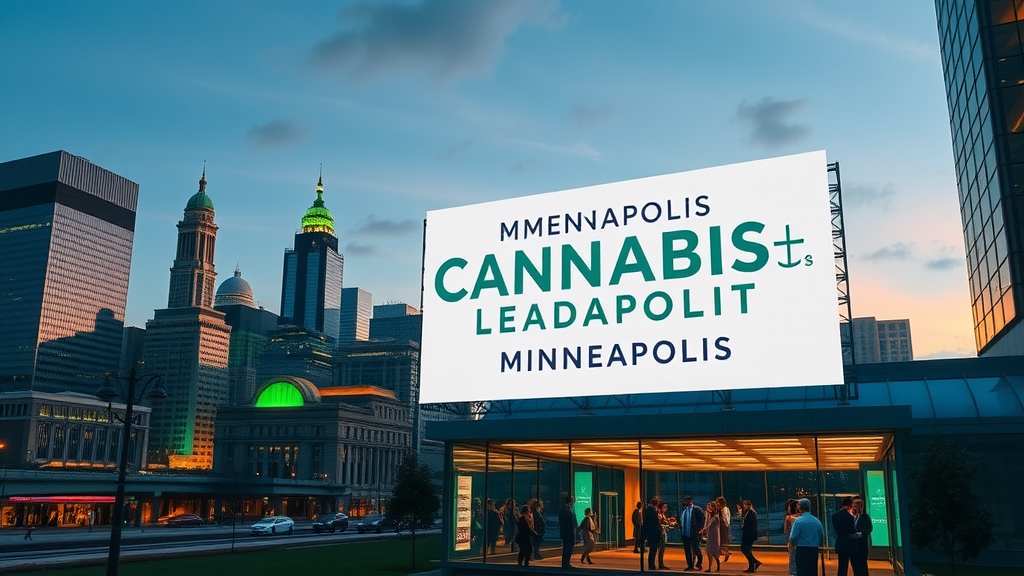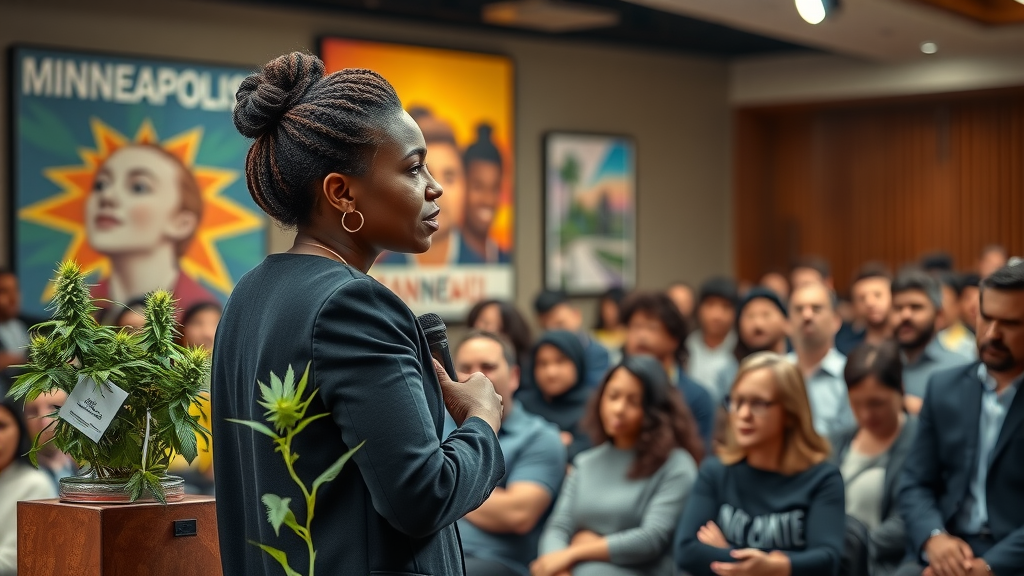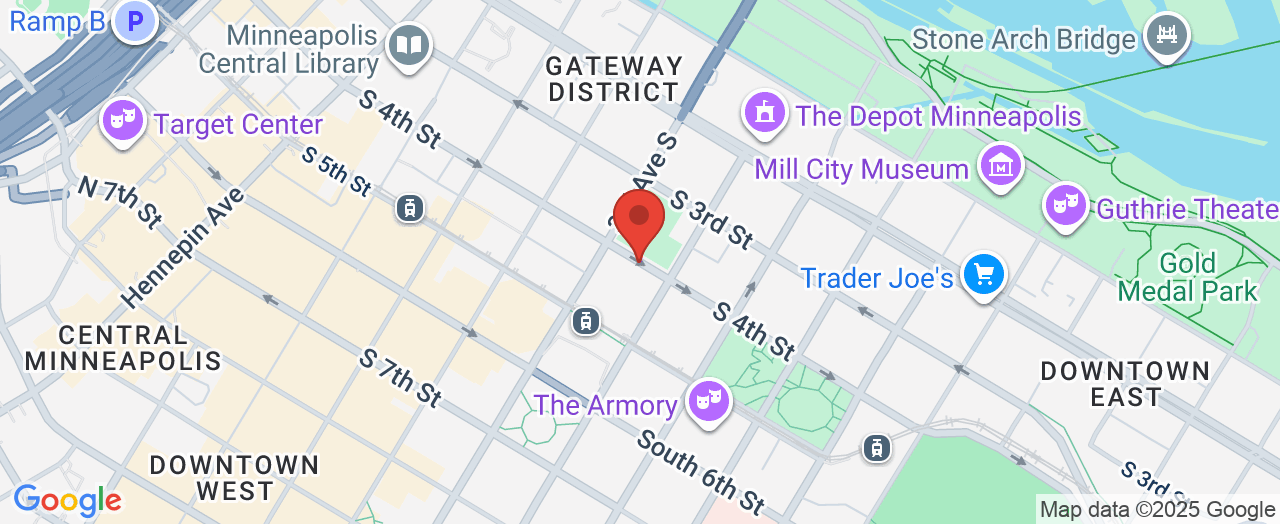
MCBA Green Equity: A Cannabis Leadership Summit
📆 Date & Time: Aug 18th, 2024 ⏰ 9:00 am
📍 Address: Multiple venues, Minneapolis
📞 Phone: +16197730771
🌐 Website: https://eventhi.io/events/green-equity-a-cannabis-leadership-summit-12186
Price
$97.0
Are You Ready to Lead Minnesota’s Cannabis Revolution? Don’t Miss the Cannabis Leadership Summit Minneapolis!
What if you could not only stay ahead of the curve in Minnesota’s emerging cannabis industry, but also shape its very foundations to be equitable, profitable, and sustainable? With the state’s adult use cannabis market newly open, industry trailblazers, aspiring entrepreneurs, investors, and policy makers face a critical moment: the chance to bypass the growing pains that hindered early adopters in other states, and to firmly place diversity, community, and sound business at the center of Minnesota’s cannabis future.
Missing the cannabis leadership summit Minneapolis this August means missing out on proven success strategies, real community connections, and essential funding know-how—all the things that can set you apart in a rapidly evolving industry. If you’re hungry for more than just another expo, and want a deep dive into what really drives business success and equity, this event is built for you.
Why Green Equity Matters Now – and Why the Cannabis Leadership Summit Minneapolis Is Where It Starts for You
The cannabis landscape in Minnesota is at a crossroads. For many, the industry’s rollout promises economic opportunity and justice, but comes with big questions: Will the new laws truly support an equitable market? How do founders of color, women, and independent entrepreneurs secure a seat at the table?
Even in 2024, only 18% of non-white-owned cannabis businesses are turning a profit nationwide. The cannabis leadership summit Minneapolis was designed by the Minority Cannabis Business Association (MCBA) with these pain points in mind. It’s your chance to avoid the costly missteps others made, by learning directly from those who have navigated and shaped mature, successful markets elsewhere. If you crave not just knowledge, but mentorship, advocacy, and insider tactics to launch and grow your cannabusiness, this summit makes it possible.
Your Complete Guide: What to Expect at the Cannabis Leadership Summit Minneapolis
Scheduled from August 18th to 20th, 2024 , the MCBA Green Equity: Cannabis Leadership Summit Minneapolis is a three-day immersion held at multiple vibrant venues across Minneapolis, MN 55401 . Registration is just $97 for the entire transformative experience, making this event not only comprehensive but accessible. Early-bird passes are available through August 8th, with additional discounts for MCBA members, previous event attendees, Green Equity Partners, and on-site activations. For a full program and to register, visit the or call +1 619-773-0771 with any questions.
cannabis leadership summit Minneapolis scene, there’s something here for you.
Parking details and accessibility information will be provided after registration. Attendees are encouraged to bring business cards, a notebook, and their drive to connect. Professional headshot opportunities and networking mixers are included, so come ready to meet the industry’s best and brightest.

Unbeatable Programming: Learning, Mentorship, and Networking at the Heart of Cannabis Leadership Summit Minneapolis
The cannabis leadership summit Minneapolis isn’t just another conference—it’s a hands-on, transformative experience spread over three days, each offering standalone value or a synergistic journey if you attend the full program. You’ll encounter national policy leaders, equity advocates, founders, funding experts, and industry mentors who have seen and shaped the evolution of legal cannabis markets. Across sessions like “Creating Economic Opportunity through Policy,” “Mastermind for Success,” and “Capital Raising Mastermind,” you’ll cover everything from regulatory know-how and fundraising strategies, to compliance, business ops, and cultural awareness.
Monday launches with a deep-dive Policy Summit at NorthPoint Conference Center featuring Minnesota’s Office of Cannabis Management (OCM) leaders and special guest Matt Robinson, plus expert discussion on municipal regulations and tribal engagement. Tuesday brings entrepreneurial masterminds, soft-skill development, and a supportive roundtable format—perfect for those seeking real feedback and actionable plans. The afternoon shifts to The Hook & Ladder for capital raising bootcamps and intimate mentor-led sessions addressing your toughest investment questions. As night falls, networking takes center stage with Dope CFO’s Elevate Night at The Wilderness, including a film festival spotlight, beverage tastings, and energetic games.
On Wednesday, the focus moves to safeguarding and celebrating cannabis culture, with community-rooted seminars at Earl Giles Distillery. Attendees drive meaningful conversations around the intersection of creativity, community, and compliance, culminating in the Green Equity Takeover CannaClub and a Storytelling Symposium that wraps up three days of connection, education, and inspiration. Complimentary professional headshots from North Minneapolis-based Imani M Photography make this summit uniquely valuable for new and established professionals alike. Every moment is shaped to boost your network, sharpen your skills, and leave you energized for the future of cannabis leadership in Minneapolis and beyond.

Why Cannabis Leadership Summit Minneapolis Is a Must for Minneapolis and Minnesota’s Cannabis Community
Minnesota’s cannabis market is fresh, ambitious, and hungry for equitable growth. By choosing Minneapolis—a city already recognized for innovation in the hemp-derived space—as the host, the cannabis leadership summit Minneapolis is placing the spotlight on local talent and leadership. The MCBA has shown deep commitment to this community, leveraging learnings from 22 other states and making Minneapolis a launchpad for a new standard in cannabis business: one that puts minority ownership, community connection, and creative problem-solving first. In just the last year, MCBA’s events have energized countless local entrepreneurs and advocates.
If you’re a Minneapolis local, this is more than a summit—it’s a call to participate in shaping a thriving local industry that values fairness, profitability, and social responsibility. Past attendees have lauded the summit for its actionable insights and lasting relationships. Even if you’re new to cannabis, this event opens doors and possibilities not available anywhere else, and connects you with the most supportive, knowledgeable community in the Midwest. For those determined to be a positive force in Minneapolis’s cannabis journey, this summit is where your story starts.
Secure Your Spot Today – The Time to Lead Is Now at the Cannabis Leadership Summit Minneapolis!

Don’t let this moment slip by. The window for building a legacy business in Minnesota’s cannabis industry will never be wider than it is today. The cannabis leadership summit Minneapolis isn’t just your next networking event; it’s the launchpad for your success, your community, and your voice in shaping a just and thriving industry. Imagine leaving with real strategies for securing funding, a bolder vision for your business, and a network of allies who lift you higher.
Early-bird tickets and special discounts mean there’s no better time to act. Spaces are limited and energy is high. Visit the now, call +1 619-773-0771 , or share this with your team. Let Minneapolis see the leadership you’re ready to bring—join the cannabis leadership summit Minneapolis and help forge the future.

 Add Row
Add Row  Add
Add 




Write A Comment